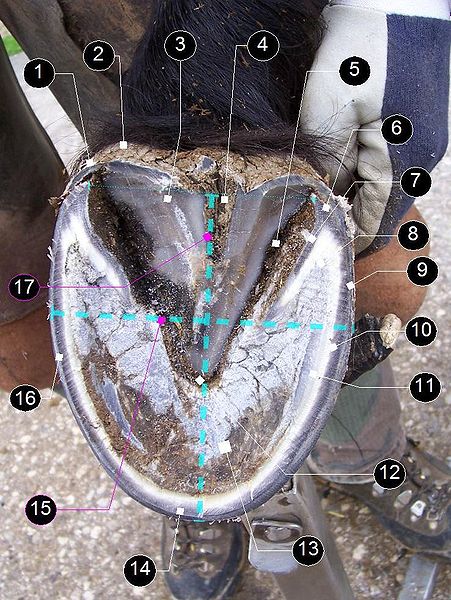 Taking a horse barefoot requires the owner to take a lot of responsibility for their horse’s feet. Gone will be the days of arranging for the farrier every 6-8 week and not thinking any further about it. Below are some tips for the transition.
Taking a horse barefoot requires the owner to take a lot of responsibility for their horse’s feet. Gone will be the days of arranging for the farrier every 6-8 week and not thinking any further about it. Below are some tips for the transition.
- If your horse was sound in shoes, then he should be sound barefoot on grass and arenas. He is likely to be sensitive on rocky terrain until his soles thicken and develop a tough callus. Hoof boots will allow you to continue riding on all surfaces during transition. Some horses will always need boots on rocky terrain, especially if your circumstances don’t allow for optimum diet and environment.
- If your horse was lame in shoes than he may need some time off when the shoes are removed. EasyCare hoof boots with pads will get you back in the saddle as soon as possible.
ABOVE: Transitioning barefoot hoof. (1)heel perioplium (2)bulb (3)frog (4)central groove (5)collateral groove (6)heel (7)bar (8)seat of corn (9)pigmented walls (external layer) (10)water line (inner layer) (11)white line (12)apex of frog (13)sole (14)toe (15)how to measure width (16)quarter (17)how to measure length.
- Be patient and considerate. It took time for the hooves to become sick and deformed and it will take time for them to become healthy again. People are sometimes unrealistic, even thoughtless when their horse first comes out of shoes, expecting the horse to cope immediately on long rides and then when the horse struggles the shoes go back on.
- A lot of thought must be given to diet, the environment the horse lives in and the amount of movement the horse gets.
- Maintain hygiene to a high standard: the bedding must be clean and dry and the feet kept clean by picking them out everyday.
- The horse must be ridden with consideration using hoof boots when necessary.
- Be prepared to tolerate the opinions of other horse owners who may feel that transitioning your horse out of shoes is unnecessary or even cruel.
If you think natural hoofcare is for you, then you have chosen a method of horse management that is challenging, but the benefits for the horse in terms of health, soundness, performance and longevity are well worth the extra effort.
Posted by Shari Murray




